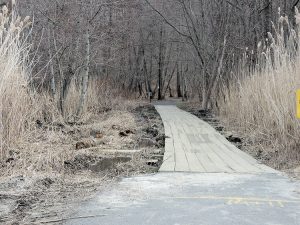ATLANTIC HIGHLANDS – Crews are now working to fortify a beloved waterfront segment of the Henry Hudson pedestrian and biking trail.
The Bayshore Trail, a 11⁄4-mile long section of the Henry Hudson Trail, extending from the Atlantic Highlands Harbor to Popamora Point in the neighboring borough of Highlands, is undergoing its most extensive repairs since Super Storm Sandy.
“We’ve come in with cheaper than thought-of construction costs,” said Ken Thoman, a park resource manager with the Monmouth County Park System (MCPS). “It’s a project that’s more resilient, and it’s something we think is going to be better than the original one.”
The scope of the project includes five sections of precast concrete boardwalk, 12 new segments of underground drainage and the replenishment of riprap rock along the shoreline – all aimed to mitigate future damages and ensure stability for years to come.
Wooden boardwalks, pathways and bridges were completely washed out by 14-foot-high storm surges during the October 2012 storm. While the trail has been open in years past, it’s now indefinitely closed to pedestrian and bicyclist traffic as construction crews work on the improvements.
Ninety percent of the $881,677 cost is being covered by the Federal Emergency Management Agency (FEMA). Atlantic Highlands will be responsible for $28,382 and the MCPS will pay $59,785. Compass Construction of New Egypt is performing the work.
Physical reconstruction to the site began about three weeks ago, according to Joe Sardonia, a supervising land architect with MCPS. He anticipates this specific section of the trail will open by fall 2017.
“This is going to happen again, and we recognize that,” Thoman said referring to future storms hitting the shore. “We also know that we’re not going to get bailed out again for it either.”
Among the upgrades to the Bayshore Trail, Thoman noted that new drainage systems would help lengthen trail life. He said the Department of Environmental Protection asked that water flow from the hillside to the water’s edge not be restricted. To install these drains, sections of the trail must be excavated and cleared out. Pipes will be laid down in a bed of sand with two fabric filters on top, backfilled with sand and run underground to the shoreline. MCPS found water pooling on the trail in these areas, causing erosion.
“We’ve used these same techniques and materials at other sites, specifically golf courses,” Thoman said.

Beyond this, the trail will have a different look with the new concrete boardwalks. Thoman said the wooden structures that were in place pre-and-post Sandy fit the style of the trail, though are not necessarily sustainable.
With these new precast pieces, the trail’s footprint on the environment decreases as well. In the past, more than 1,000 linear feet of wood boardwalk was used – that is now down to 630 linear feet.
Atlantic Highlands borough owns an approximately 1/5-of-a-mile stretch of trail at the mouth of the municipal harbor. It’s the last section of the Henry Hudson Trail that has paved asphalt. According to Adam Hubeny, Atlantic Highlands’ borough administrator, a portion of their work is going towards a 3-inch thick asphalt base course in that section – at a cost of $25,347.
Paying for usage of the Bayshore Trail is not uncommon in Atlantic Highlands. In 2009, the borough opened that section of the Henry Hudson Trail to the public as part of a nearly $1.3 million project, which was heavily funded – the borough paid around $300,000 for that work.
This pristine connection, which rolls along the Sandy Hook Bay, is prime real estate for bikers and pedestrians alike. Trail users can access the Bayshore Trail from the harbor entrance and Popamora Point, with the Sandy Hook Bay just feet away and a scenic view of the New York City skyline off in the distance.
Hubeny said the trail serves as a great asset for summertime traffic, bringing people into the borough who normally would not spend a day there.
“If someone wanted to come here from New York City on a weekend, they would have to come through Highlands,” Hubeny said. “On a nice summer day, they can walk the trails and get here for everything they need.”
In the 19th century, the Henry Hudson Trail was a light rail line operated by the Central Railroad of New Jersey, ranging from Aberdeen to Atlantic Highlands, according to the book “The First Fifty Years: The Monmouth County Park System,” published by the Friends of the Monmouth County Parks. In 1980, Monmouth County received a state grant to purchase the route from Conrail.
The trail now extends from Freehold to Popamora Point in Highlands, totaling 24 miles.
“The major argument for building the trail in the first place is still there,” said Thoman. “It’s connecting communities, schools and businesses.”














